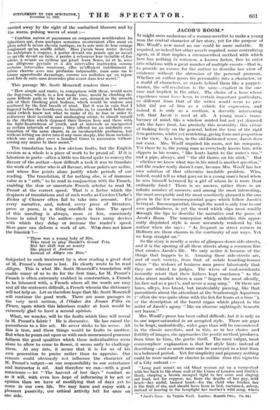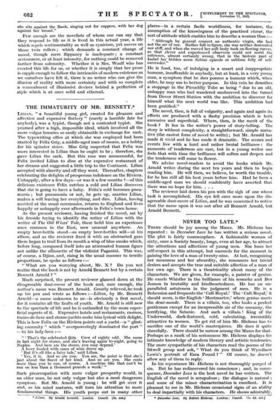JACOB'S ROOM.* IT might seem audacious of a woman-novelist to
make a young man the central character of her story, yet for the purpose of
Mrs. Woolf's new novel no one could be more suitable. It
required, as indeed her other novels required, some centralizing agent, or if that implies a circumscribed method with which hers has nothing in common, a known factor, free to enter into relations with a great number of multiple events—that is. to provide an excuse for the author to describe her view of existence without the obtrusion of the personal pronoun.
Whether an author pours his personality into a character, or a world of characters, or stands behind them like a puppet- master, the self-revelation is the same—explicit in the one case and implicit in the other. The choice of a hero whose experience must have been, in certain important particulars. so different from that of the writer would seem to pro- hibit the use of him as a vehicle for expression, and indeed it is only as a medium, a decently intervening veil, that Jacob is used at all. A young man's trans- lucency of mind, like a window misted but not yet dimmed with the later frost, has precisely this neutrality, this virtue of looking freely on the general, before the time of the rigid fern-patterns, whilst yet restricting, giving form and proportion to the view. As a hero, in the old-fashioned sense, Jacob does not exist. Mrs. Woolf required his room, not his company.
Yet there he is, the young man as everybody knows him, with slippers in his rooms, " like boats burnt to the water's rim,', and a pipe, always, and " the old thorns on his stick." But " whether we know what was in his mind is another question," and the reader really doesn't care, because Mrs. Woolf has her own solution of that otherwise insoluble problem. Who, indeed, could tell us what goes on in a young man's head when he sees himself betrayed by a girl of whom he is more than
ordinarily fond ? There is no answer, rather there is an infinite number of answers, and among the most interesting, the most acceptable and the most sensitively phrased is the one given in the few inconsequential pages which follow Jacob's betrayal. Inconsequential, though the word is only true to our own purblindness, is yet the word which slips most readily through the lips to describe the narrative and the prose, of
Jacob's Room. The conception which underlies this appar- ently disjointed style is more accurately rendered by the author when she says : " As frequent as street corners in Holborn are these chasms in the continuity of our ways. Yet we keep straight on."
So the story is mostly a series of glimpses down side-streets, and it is the opening of all these streets along a common line that creates Jacob's life. We only notice it because of the things that happen to it. Amazing these side-streets are, and of such variety, from that of sedate boarding-houses where " the widows of business men prove laboriously that they are related to judges. The wives of coal-merchants instantly retort that their fathers kept coachmen " to the Soho street market where a man " fingers the meat silently, his face sad as a poet's, and never a song sung." Or there are lanes, alleys, less broad, but incalculably piercing, like that parenthesis about the attendant at the Scarborough Aquarium (" often she was quite alone with the fish for hours at a time "), or the description of the barrel organ which played in the midst of Jacob's agony " like an obscene nightingale beneath wet leaves."
Mrs. Woolf's prose has been called difficult, but it is only so to one super-saturated in an accepted style. There are gaps to be leapt, undoubtedly, wider gaps than will be encountered in the classic novelists, and in this, as in her choice and fertility of images, she approaches the poetic method,'produccs,
from time to time, the poetic thrill. The most vulgar, most commonplace explanation is that her style hints instead of describing—and so much more can be conveyed in a hint than in a balanced period. Yet for simplicity and piquancy nothing could be more natural or chaster in outline than this vignette
of a City outcast :-
"Long past sunset an old blind woman sat on a camp-stool with her back to the stone wall of the Union of London and Smith's Bank, clasping a brown mongrel tight in her arms and singing out loud, not for coppers, no, from the depths of her gay, wild heart—her sinful, tanned heart—for the child who fetches her is the fruit of sin, and should have been in bed, curtained, asleep, instead of hearing in the lamplight her mother's wild song, where • Jacob's Room. By Virginia Woolf. London : Roger% Press. 17s. Od.)
she sits against the Bank, singing not for coppers, with her dog against her breast."
Few enough are the novelists of whom one can say that they respond to life as it is lived in this actual year, a life which repels sentimentality as well as cynicism, yet moves on those twin rollers ; which demands a constant change of mood, though mere flippancy is inadequate ; a constant seriousness, or at least intensity, for nothing could be removed farther from solemnity. Whether it is Mrs. Woolf who has created this life for us, or whether it is simply that her prose is supple enough to follow the intricacies of modern existence as we ourselves have felt it, there is no writer who can give the illusion of reality with more certainty and with so complete a concealment of illusionist devices behind a perfection of style which is at once solid and ethereal.



























































 Previous page
Previous page